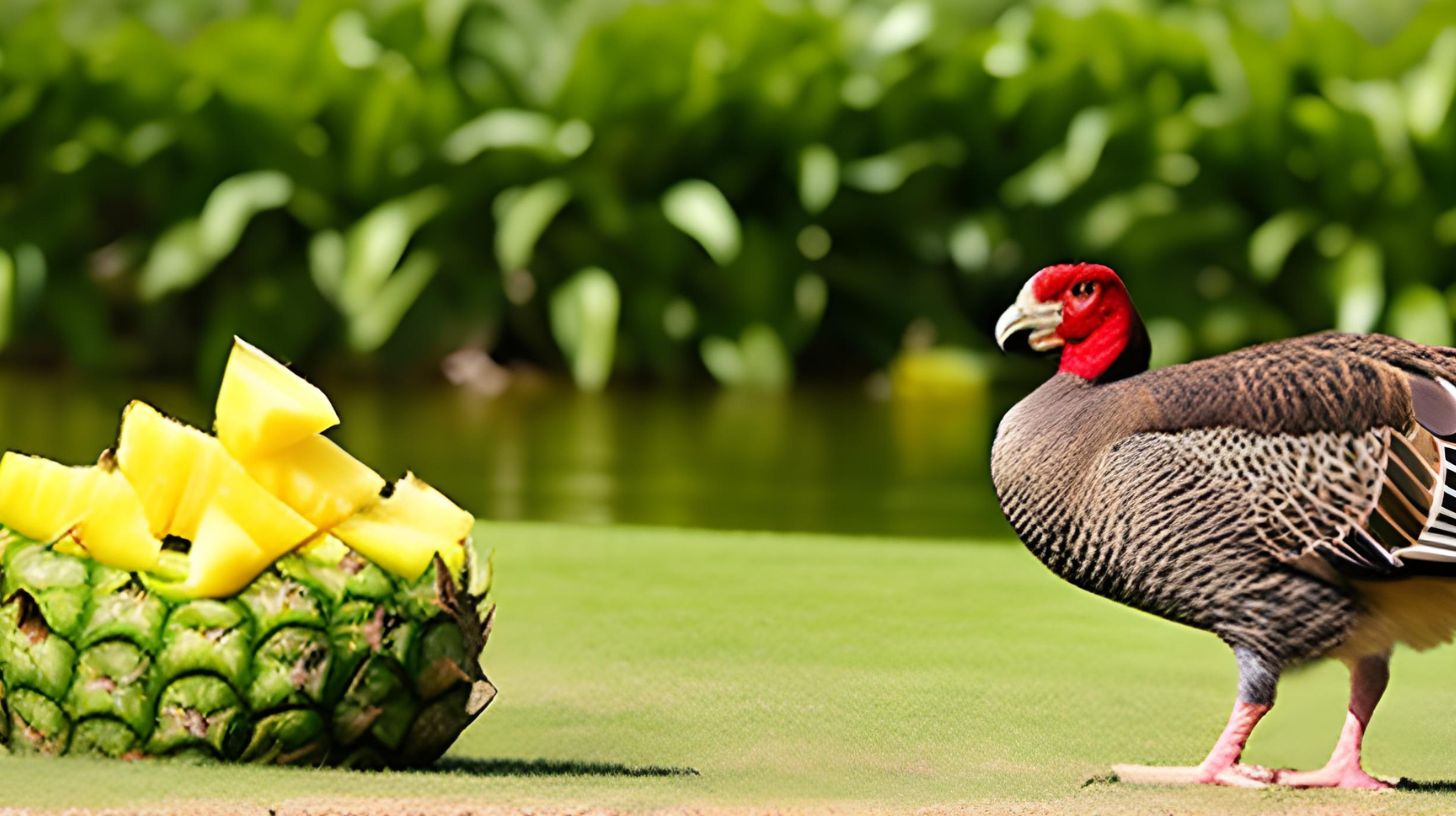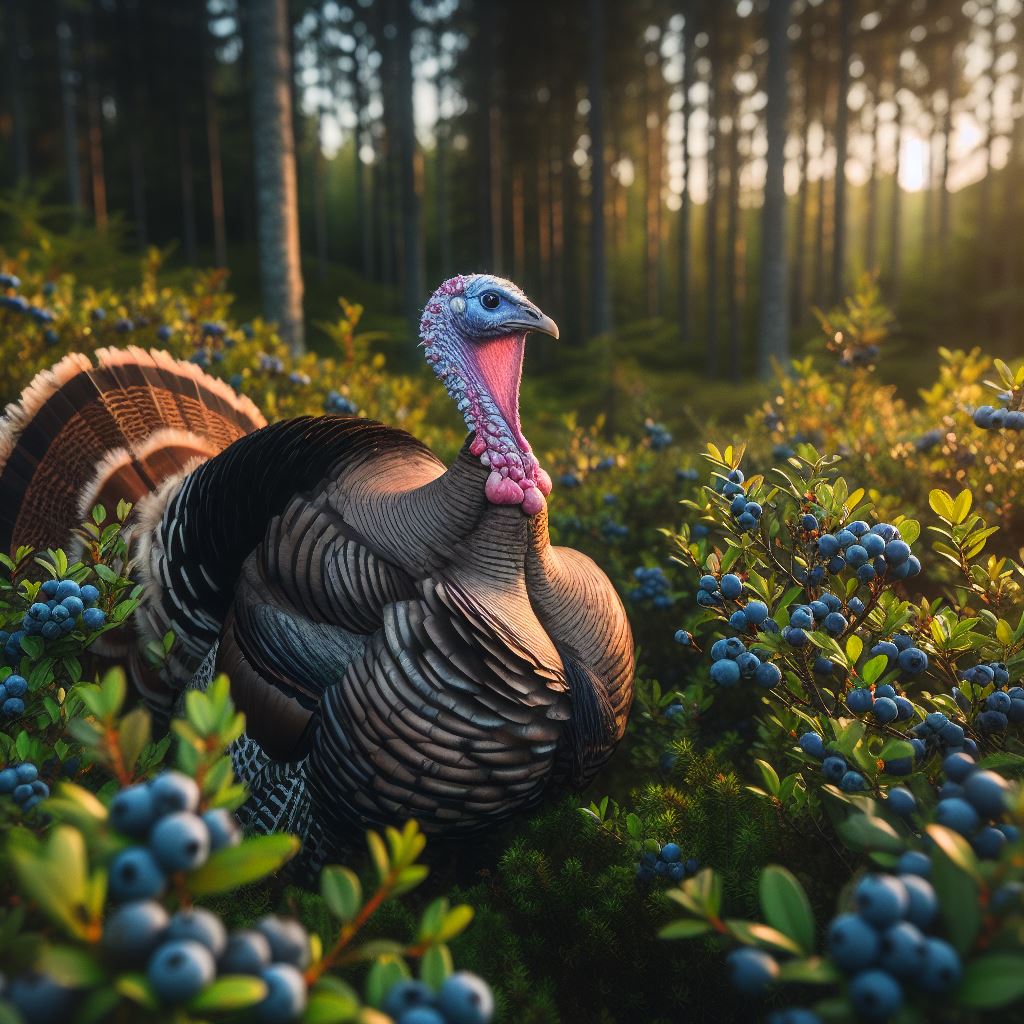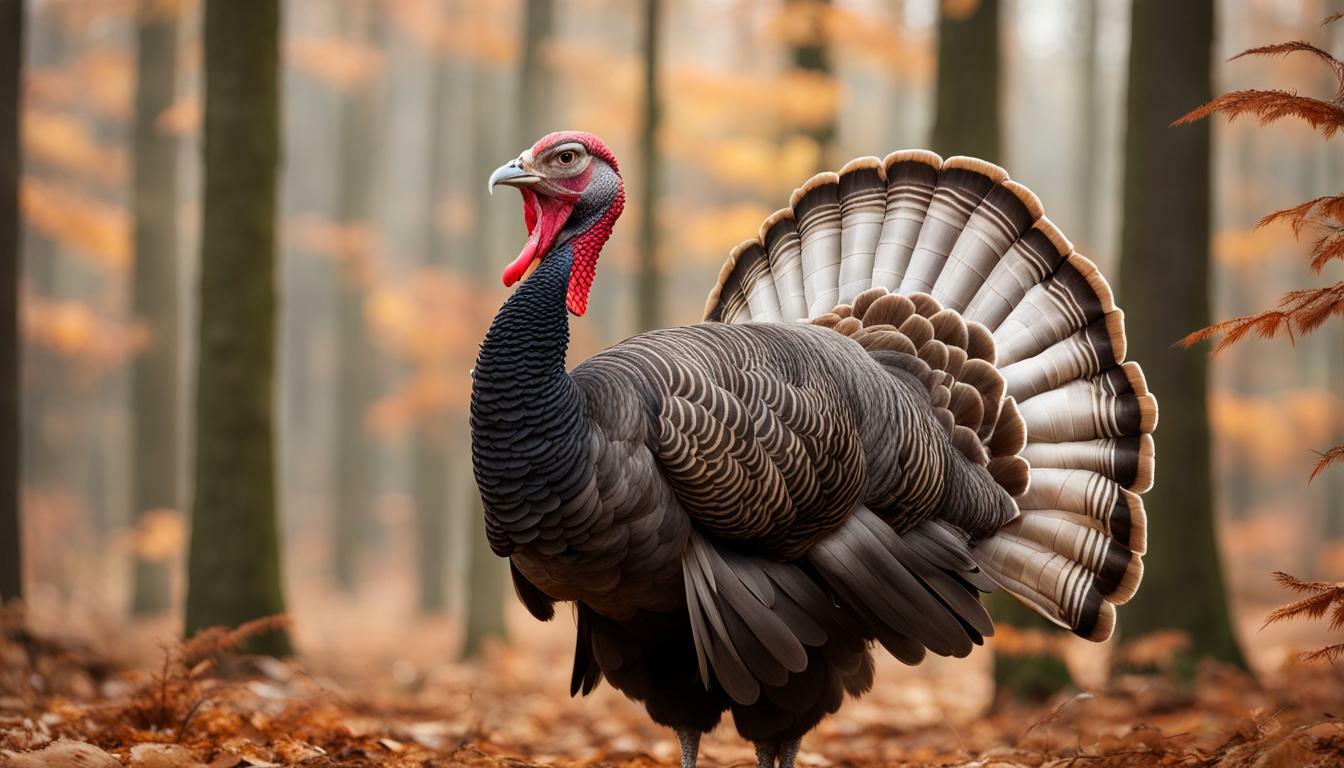Can Turkeys Eat Pineapple? Uncover the Facts Today

Table of content:
- Nutritional Value of Pineapple for Turkeys
- Concerns About Feeding Pineapple to Turkeys
- Feeding Guidelines for Pineapple and Turkeys
- Health Benefits of Pineapple for Turkeys
- Can Wild Turkeys Eat Pineapple in Nature?
- Are There Any Benefits to Feeding Pineapple to Poults?
- Signs of Pineapple Intolerance in Turkeys
- Are There Any Health Risks Associated with Feeding Pineapple?
- Answers to Common Pineapple-Related Questions
- Final Thoughts
Pineapple is a sweet, tasty tropical fruit that many people enjoy. But can turkeys eat pineapple? As a poultry owner, you want to feed your birds a nutritious diet. Understanding what turkeys can and cannot eat is key to keeping them healthy.
Nutritional Value of Pineapple for Turkeys
Pineapple contains a variety of vitamins and minerals that can benefit turkeys. Here are some of the main nutrients found in pineapple:
- Vitamin C: Turkeys require vitamin C for collagen production, immune health, and antioxidant protection. One cup of pineapple chunks provides over 100% of a turkey’s recommended daily vitamin C intake.
- Manganese: This mineral is needed for bone health and enzyme function in turkeys. Pineapple is a rich source, providing over 150% of a turkey’s manganese needs per cup.
- Vitamin B1: Also known as thiamin, vitamin B1 supports energy metabolism and nerve health in turkeys. Pineapple provides 12% of a turkey’s daily thiamin needs in a one-cup serving.
- Copper: Turkeys require copper for melanin production, iron absorption, and connective tissue strength. One cup of pineapple provides around 10% of a turkey’s copper needs.
So in moderation, pineapple can provide useful antioxidants, vitamins, and minerals for turkeys. But there are also some potential downsides to consider.
Concerns About Feeding Pineapple to Turkeys
While pineapple boasts an impressive nutrient profile, there are some possible issues with feeding it to turkeys:
1. High Sugar Content
Pineapples have a very sweet taste because they contain a lot of natural sugar. One cup of pineapple chunks has approximately 16 grams of sugar. Consuming too much sugar can lead to weight gain and metabolic issues in turkeys over time.
2. Acidity
Pineapple has a very low pH, meaning it is quite acidic. The high acid content can irritate a turkey’s digestive tract if they eat too much. The bromelain enzymes in pineapple may also contribute to intestinal upset in some birds.
3. Risk of Choking
The fibrous texture and odd shape of pineapple chunks or cores pose a choking risk for turkeys. Choking is uncommon but possible if the turkey tries to swallow large, jagged pieces of pineapple.
4. Pesticide Residues
Non-organic pineapple may contain traces of pesticides, insecticides, or herbicides that could be harmful to turkeys over time. This is especially concerning for young poults. Choosing organic minimizes this risk.
So pineapple should be fed sparingly and in moderation to minimize adverse effects in turkeys. But small infrequent portions may be safely enjoyed by most birds.
Feeding Guidelines for Pineapple and Turkeys
When introducing any new food, start slowly and watch for signs of tolerance. Here are some tips for safely feeding pineapple to turkeys:
- Select ripe, fresh pineapple. Canned pineapple packed in juice is also an option but avoid added sugars.
- Wash thoroughly and core the pineapple to remove any tough, fibrous chunks.
- Chop the flesh into bite-sized pieces no larger than 1/2 inch.
- Feed no more than 2-3 small chunks per bird, 2-3 times per week at most.
- For young poults under 4 weeks old, just offer a taste on the tip of your finger at first.
- Monitor turkeys closely when eating pineapple and remove any uneaten portions.
- Discontinue feeding if you notice signs of indigestion, diarrhea, or lack of appetite.
- Avoid letting turkeys graze freely on pineapple tops due to the choking hazard from leaves.
With proper precautions, most healthy turkeys can enjoy an occasional pineapple treat. But it should never make up a substantial part of their diet.
Health Benefits of Pineapple for Turkeys
When fed judiciously, pineapple can provide the following benefits:
- Vitamin C for immunity: The high vitamin C content boosts turkeys’ immune defense against disease.
- Anti-inflammatory effects: Bromelain enzymes in pineapple exhibit anti-inflammatory properties that may promote gut and joint health.
- Hydration: Pineapple’s water content helps keep turkeys well-hydrated, especially important in hot climates.
- Digestive support: Some evidence shows bromelain aids protein digestion, which may support growth and nutrient absorption in young, growing turkeys.
- Antioxidant protection: Vitamin C, copper, and other antioxidants help combat free radicals and oxidative stress in turkeys.
So while high in sugar, pineapple does have some valuable nutritional qualities when used as an occasional treat.
Can Wild Turkeys Eat Pineapple in Nature?
Wild turkeys roaming freely in nature are unlikely to encounter or consume pineapple regularly. Pineapples only grow in tropical or subtropical climates, while wild turkeys live predominantly in temperate forests and grasslands.
However, wild turkeys may potentially snack on pineapple if:
- They live near a pineapple plantation.
- Someone puts pineapple out as feed.
- They come across pineapple remnants in compost or trash.
In these cases, wild turkeys could eat small amounts of pineapple flesh, tops, or discarded cores. With their diverse natural diet, they are less likely to experience adverse effects. But pineapple should still be limited, as excess sugar and acidity can cause issues for any bird.
Overall, pineapple is not a routine part of a wild turkey’s diet. But if available, they may sample it in modest portions with minimal harm.
Are There Any Benefits to Feeding Pineapple to Poults?
Poults are young turkey chicks under 4 weeks of age. Their digestive system is still developing, so their diet requires special care.
Feeding a bit of pineapple may benefit poults in small doses, as it provides:
- Extra hydration from the high water content.
- A natural probiotic effect to support gut health.
- Vitamin C and manganese for immunity and growth.
- Bromelain to potentially improve protein digestion.
However, moderation is key as too much sugar and acidity can lead to diarrhea or upset stomach in delicate poults. Here are some tips for feeding pineapple to poults:
- Only offer a thin slice or two initially.
- Chop the flesh into tiny, poult-sized bits.
- Feed separately from other foods to observe tolerance.
- Discontinue use if any signs of loose stool or lethargy.
- Increase portion size slowly as poults mature.
Following these precautions, pineapple can be a safe, nutritious supplement for poults older than 1 week. But it should never become a dietary staple.
Signs of Pineapple Intolerance in Turkeys
Most healthy turkeys tolerate small feedings of pineapple without issue. But in some birds, negative symptoms may signal their digestive system does not agree with it. Signs of intolerance can include:
- Loose, watery droppings
- Lack of appetite or disinterest in food
- Increased thirst and urination
- Vomiting (rare but possible)
- Stained vents
- Weight loss
- Lethargy or sleepiness
If you observe any of these signs, discontinue pineapple right away. The sugar and acidity may be too irritating for that individual bird’s constitution.
Issues are most likely to occur if turkeys eat pineapple on an empty crop, consume spoiled portions, or eat too much at once. Feeding good-quality pineapple in conservative amounts reduces risk of adverse reactions.
Are There Any Health Risks Associated with Feeding Pineapple?
As with any human food offered to animals, feeding pineapple does carry some potential health risks for turkeys:
- Obesity: The high sugar load could lead to excessive weight gain and related issues if fed routinely.
- Diabetes: Excess sugar may tax the endocrine system and pancreas over time, increasing diabetes risk.
- Digestive upset: Both the sugars and acids in pineapple could irritate the gut lining, especially in excess amounts.
- Dehydration: The diuretic, laxative effect of high sugar intake causes fluid loss, which could become dangerous if intake is not managed.
- Choking hazard: The texture and shape of chunks make choking possible, especially in poults.
To minimize these risks, feed pineapple in conservative amounts only periodically. Make sure turkeys always have access to fresh water too. Lastly, inspect all portions and remove fibrous cores or rinds.
Answers to Common Pineapple-Related Questions
Here are some quick answers to other common questions turkey owners may have:
Can turkeys eat pineapple cores? No. The fibrous core is a choking risk and provides minimal nutritional value.
Can turkeys eat pineapple skin? Yes, the skin is safe, but may cause loose droppings if overdone.
Can turkeys eat pineapple leaves/tops? No. The spiny leaves present a choking hazard and irritation to the throat and crop.
Can turkeys eat canned pineapple? Yes, canned pineapple packed in juice is safe. But avoid any with added sugars.
Can turkeys eat dried pineapple? Dried pineapple is very high in sugar content, so only offer it rarely in tiny amounts if at all.
Can turkeys eat pineapple juice? The juice is very high in sugars, so best avoided. Small sips of diluted juice mixed into water could be an option.
Final Thoughts
Can turkeys eat pineapple? In moderation, both domestic and wild turkeys can enjoy small portions of this sweet, tropical fruit as an occasional snack. Pineapple provides beneficial nutrients like vitamin C and manganese. It also offers antioxidants, hydration, and potential digestion-aiding enzymes.
However, pineapple must be fed conservatively due to the high sugar and acidity. Introduce it slowly, watch for signs of intolerance, and monitor your birds’ overall diet and health. With smart feeding practices, pineapple can be a safe, nutritious treat both meat and pet turkey varieties can enjoy. But it should never become a dietary staple.
Welcome. I’m Adreena Shanum, the proud owner of this website, and I am incredibly passionate about animals, especially poultry. I founded adreenapets.com as a labor of love, stemming from my desire to share my knowledge and experiences with poultry enthusiasts worldwide.



